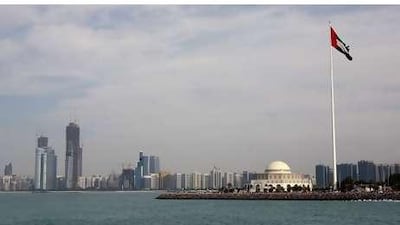Abu Dhabi's public finances are expected to end the year in the black as higher oil prices allow GCC governments to sustain fiscal stimulus measures. The forecast comes despite previous official projections of the emirate posting a budget deficit this year.
Understated budget revenues from oil and other income sources in the country's forecast should help both the emirate's and Federal budgets finish in surplus, said Giyas Gokkent, the chief economist at National Bank of Abu Dhabi. "Fiscal balances are strong and may be better than they appear," Mr Gokkent said. "When the authorities report their budgets the expenditure is as it appears but the revenues are understated compared to IMF projections."
A conservative oil price assumption of US$60 a barrel and the exclusion of some revenue items meant the Abu Dhabi Government's budget estimate was lower than projections by the IMF, said Mr Gokkent. The emirate's budget deficit was about $30 billion (Dh110.19bn) last year and a further shortfall of $23.1bn is projected this year, according to a recent prospectus of a government-guaranteed bond. The IMF in February forecast the consolidated UAE budget would be Dh89.4bn in surplus this year. Including the accounts of the Federal Government, Abu Dhabi, Dubai and Sharjah, in addition to estimated revenues from government oil and gas companies, earnings from sovereign wealth funds and taxes, the consolidated budget forecast by the IMF is considered by economists as a thorough estimate of the state of government finances.
That current oil prices are above $80 and forecast to stabilise at historically high levels bodes well for all GCC states. They were on course to overturn a slight budget deficit last year and post an estimated combined budget surplus of $109bn this year, led by healthy surpluses in Saudi Arabia, the UAE and Kuwait, said Mr Gokkent. "The futures market indicates that oil prices will average at close to $78 per barrel in 2010," said Tristan Cooper, a vice president and senior credit officer at the ratings agency Moody's Investors Service in Dubai.
"At this level, most of the region's oil exporters should record comfortable fiscal surpluses despite rising expenditure." As with most other GCC states, the Abu Dhabi Government plans to spend more money this year than last. Qatar and Kuwait would both increase their budgets by 25 per cent this year, with Saudi Arabia raising its budget by 14 per cent and Oman by 12 per cent, according to a report released by Moody's on Tuesday.
The increases are impressive considering many governments already rolled out expansionary budgets last year in an effort to revive their economies amid the global financial crisis. "The governments are taking on the role of stimulating the economy," said Paul Gamble, the head of research at Jadwa Investment in Saudi Arabia. The higher spending within the GCC contrasts with the gradual withdrawal of fiscal stimulus packages in Europe and other parts of the world as governments try to bring budget deficits under control. It should also provide a much-needed tonic to the private sector in need of an economic boost due to weak consumer confidence and slow bank lending, say analysts.
"This injection of cash should help to enliven private sectors in these countries, which remain lacklustre following the bursting of the region's bank credit bubble in 2008-2009," said Mr Cooper. tarnold@thenational.ae

